Now some said that he had found the Well, and drank thereof; others naysaid that; but all deemed that they knew how that Goldburg was not done building ere that lord was slain in a tumult, and that what was then undone was cobbled up after the uncomely fashion of the towns thereabout.
Clement said moreover that, this happy lord dead, things had not gone so well there as had been looked for. Forsooth it had been that lord’s will and meaning that all folks in Goldburg should thrive, both those who wrought and those for whom they wrought. But it went not so, but there were many poor folk there, and few wealthy.
Again said Clement that though the tillers and toilers of Goldburg were not for the most part mere thralls and chattels, as in the lands beyond the mountains behind them, yet were they little more thriving for that cause; whereas they belonged not to a master, who must at worst feed them, and to no manor, whose acres they might till for their livelihood, and on whose pastures they might feed their cattle; nor had they any to help or sustain them against the oppressor and the violent man; so that they toiled and swinked and died with none heeding them, save they that had the work of their hands good cheap; and they forsooth heeded them less than their draught beasts whom they must needs buy with money, and whose bellies they must needs fill; whereas these poor wretches were slaves without a price, and if one died another took his place on the chance that thereby he might escape present death by hunger, for there was a great many of them.
CHAPTER 28
Now They Come to Goldburg
That night they slept yet amongst the mountains, or rather in the first of the hill country at their feet; but on the morrow they rode down into the lowlands, and thereby lost all sight of Goldburg, and it was yet afar off, so that they rode four days through lands well-tilled, but for the most part ill-housed, a country of little hills and hollows and rising grounds, before they came in sight of it again heaving up huge and bright under the sun. It was built partly on three hills, the buttresses of a long ridge which turned a wide river, and on the ridge itself, and partly on the flat shore of the river, on either side, hillward and plainward: but a great white wall girt it all about, which went right over the river as a bridge, and on the plain side it was exceeding high, so that its battlements might be somewhat evened with those of the hill-wall above. So that as they came up to the place they saw little of the town because of the enormity of the wall; scarce aught save a spire or a tall towering roof here and there.




